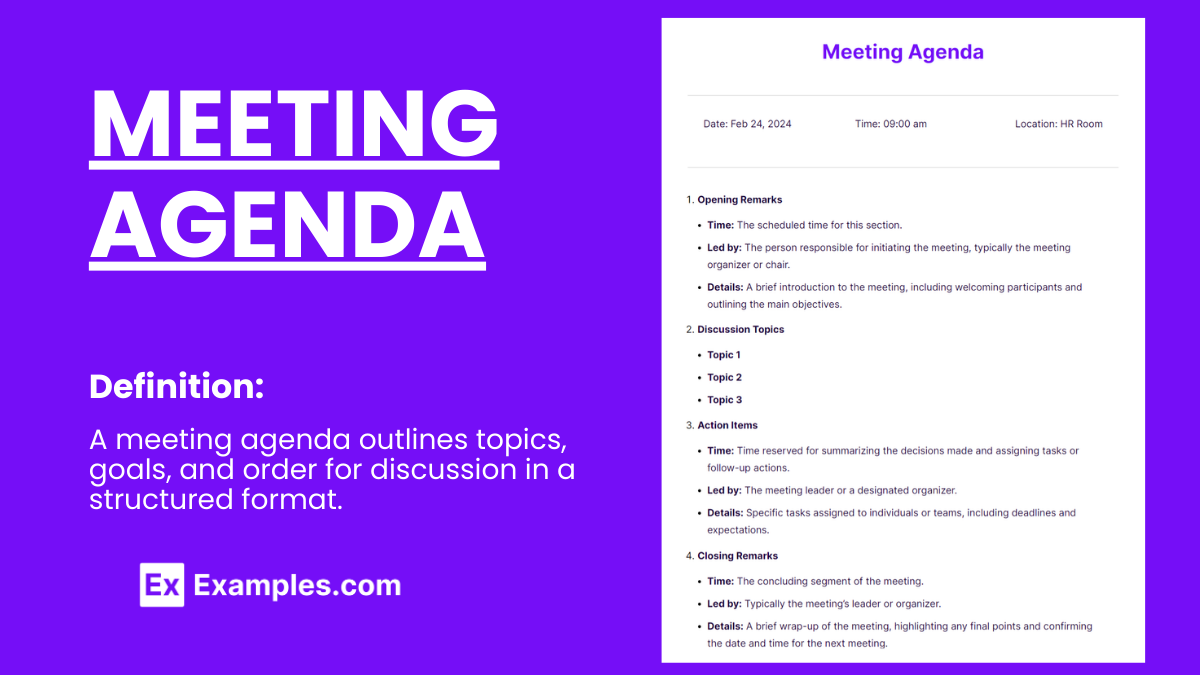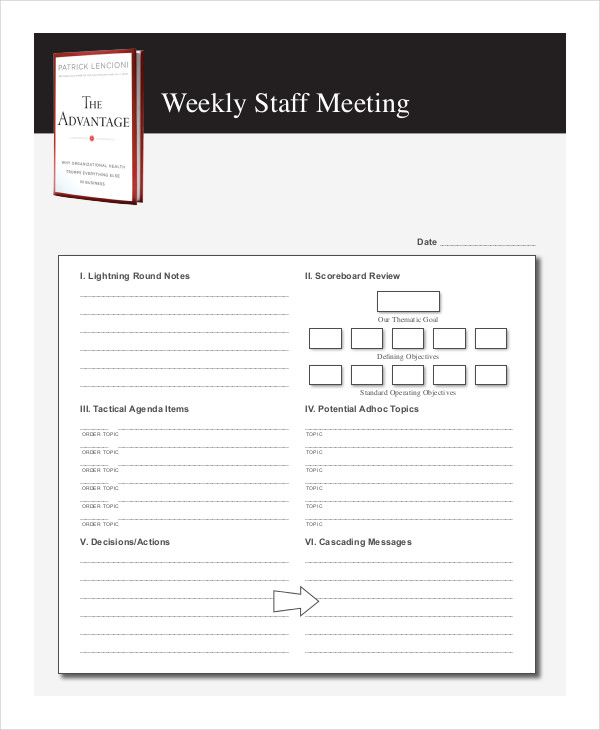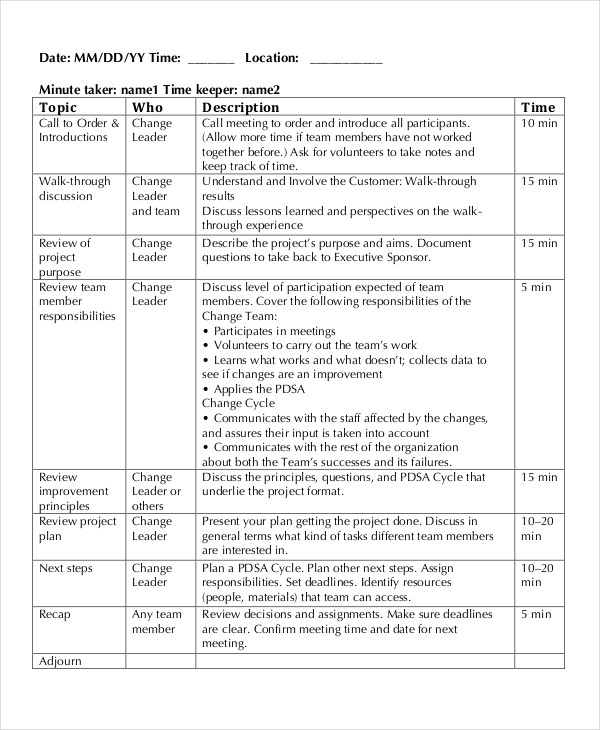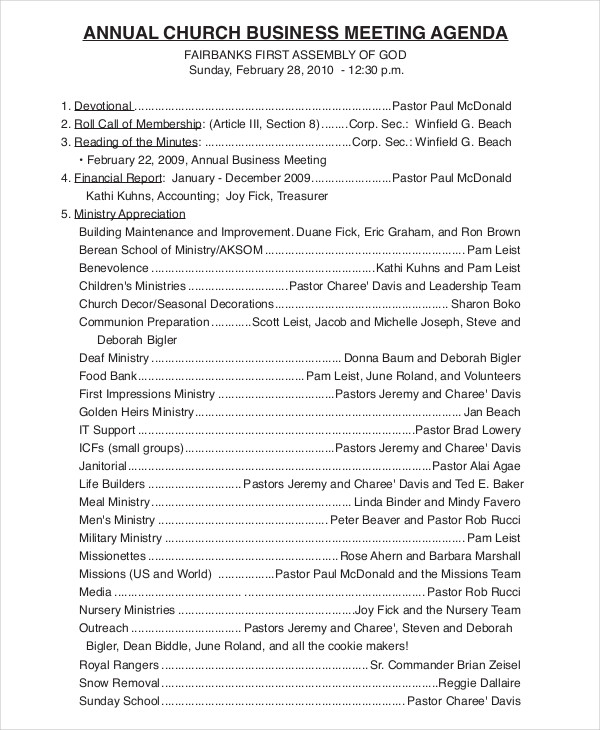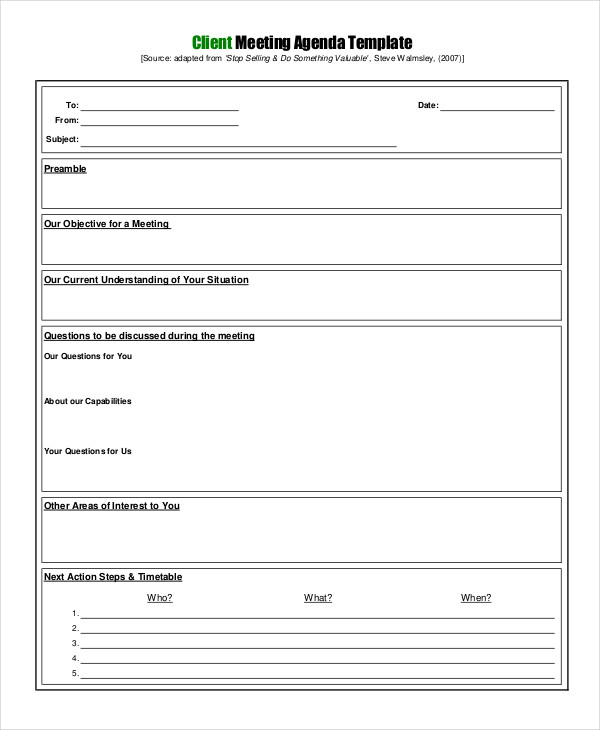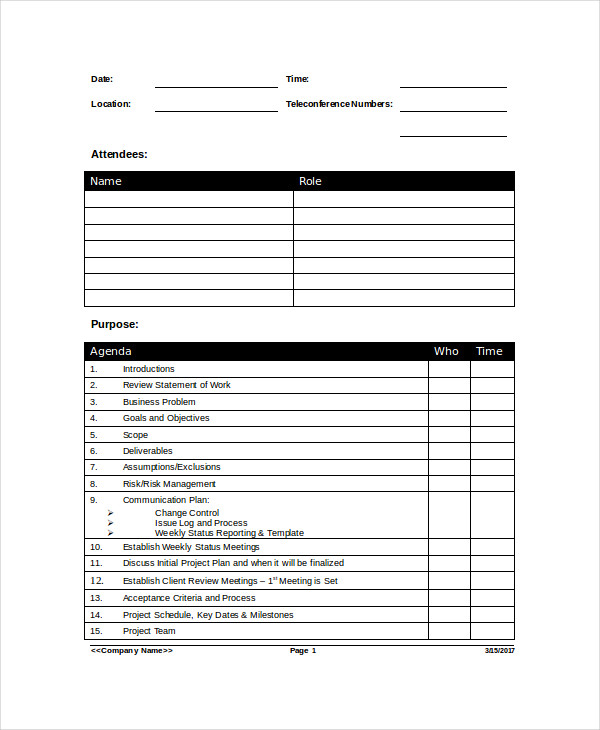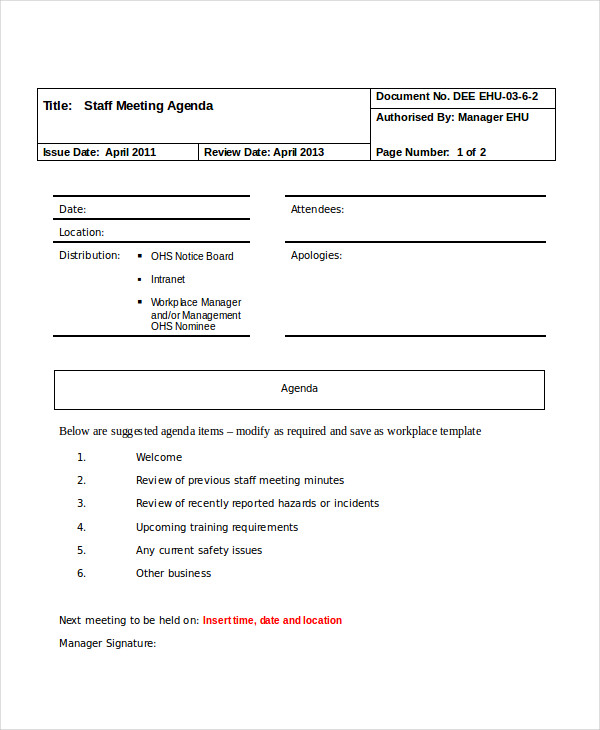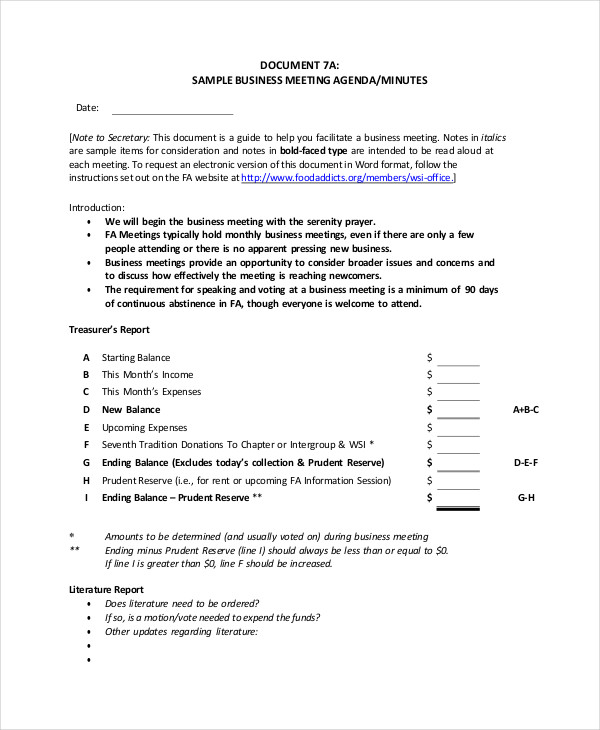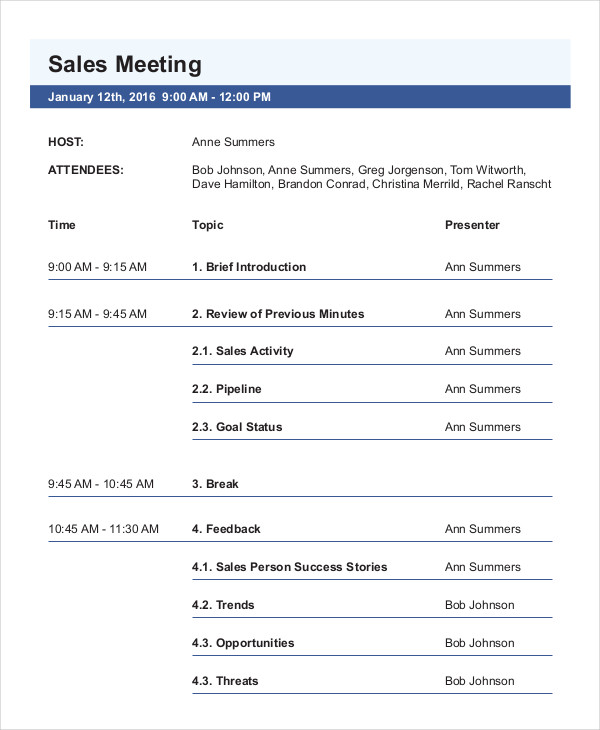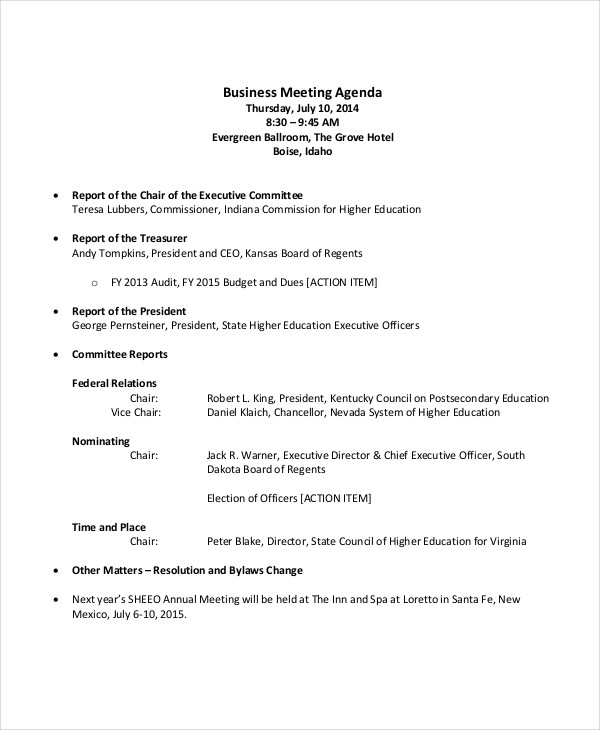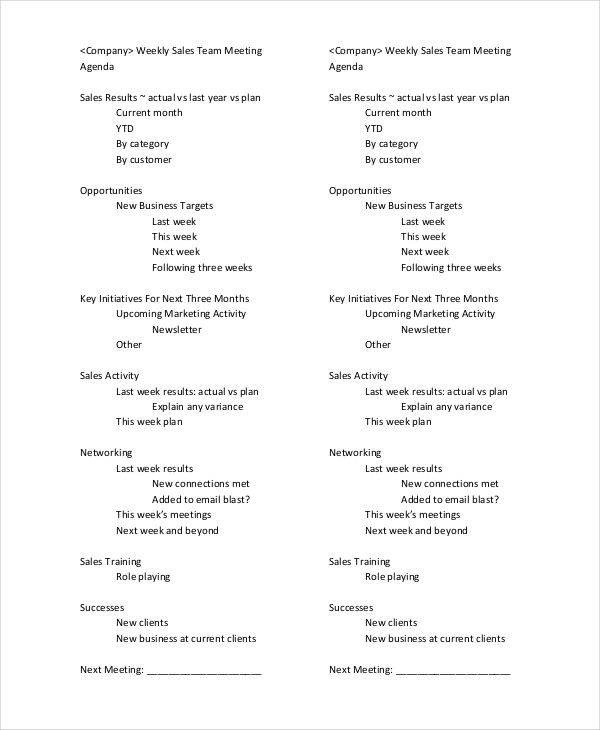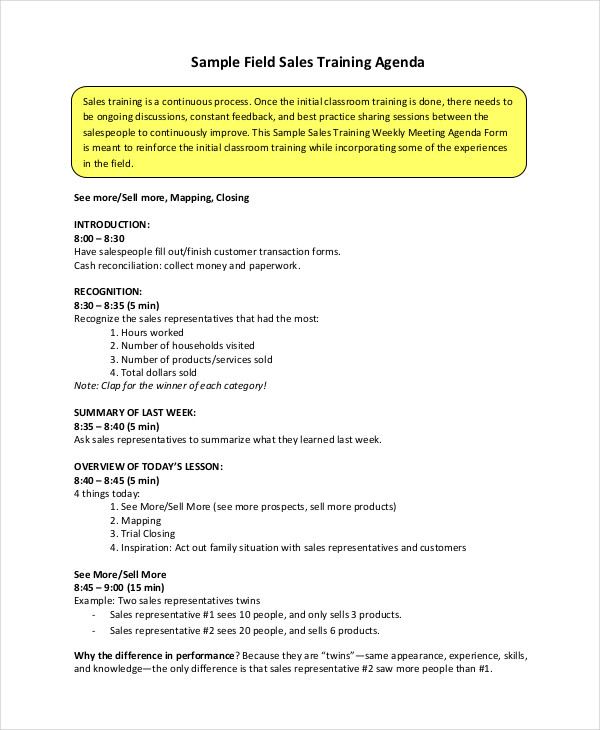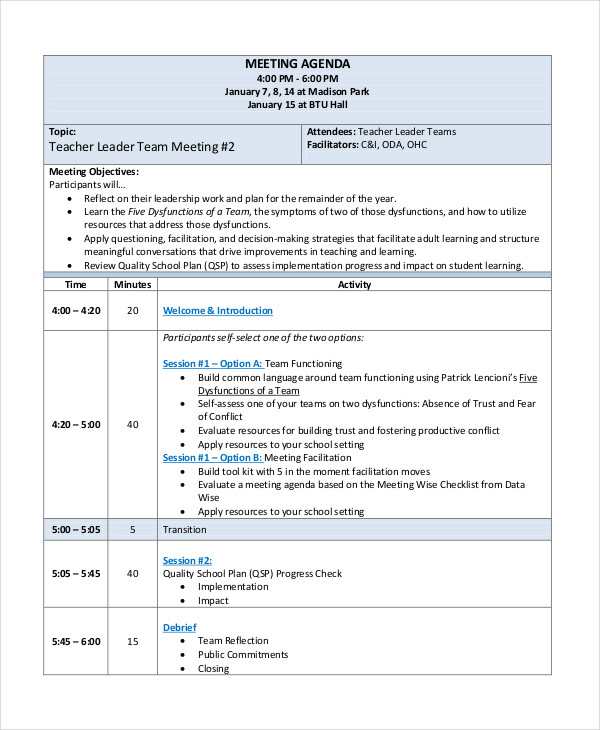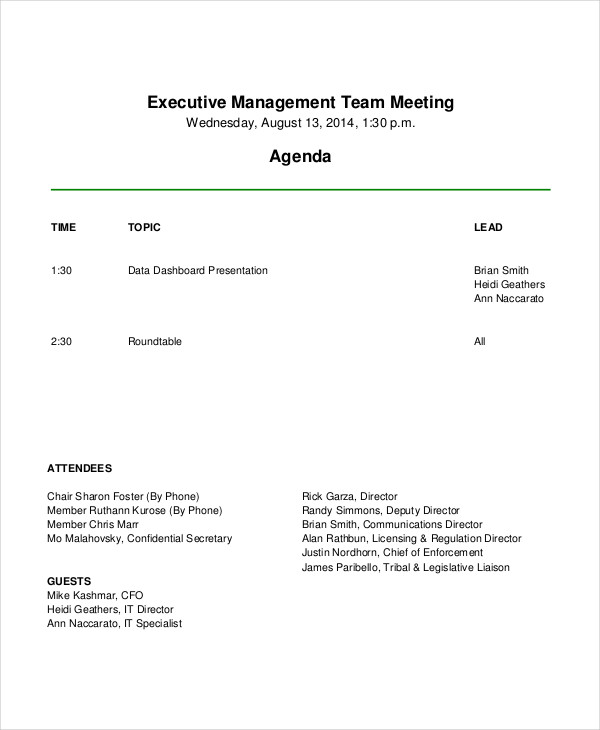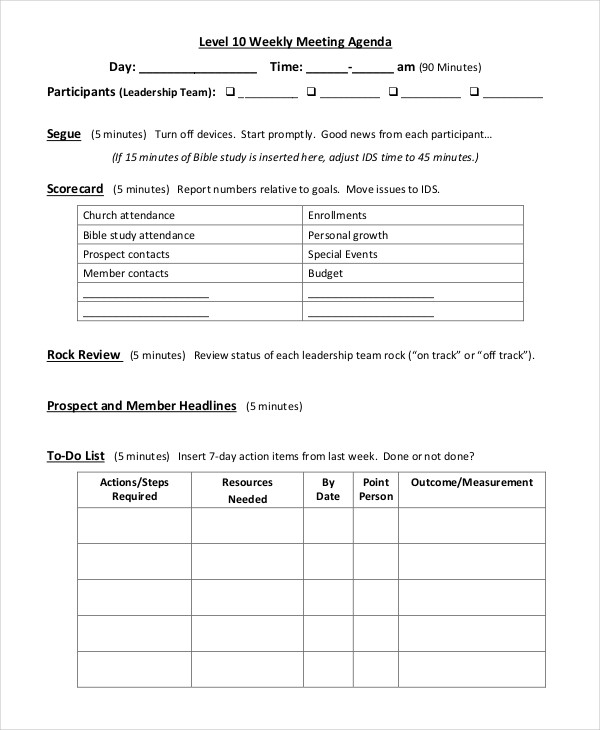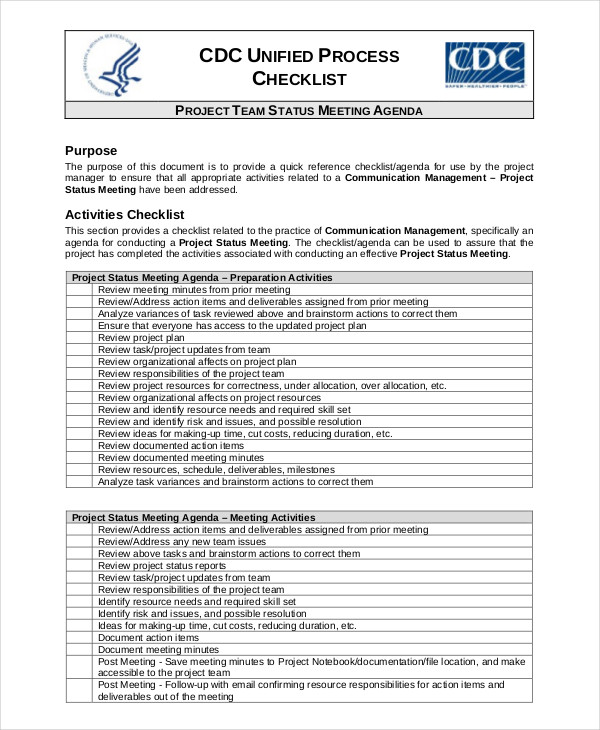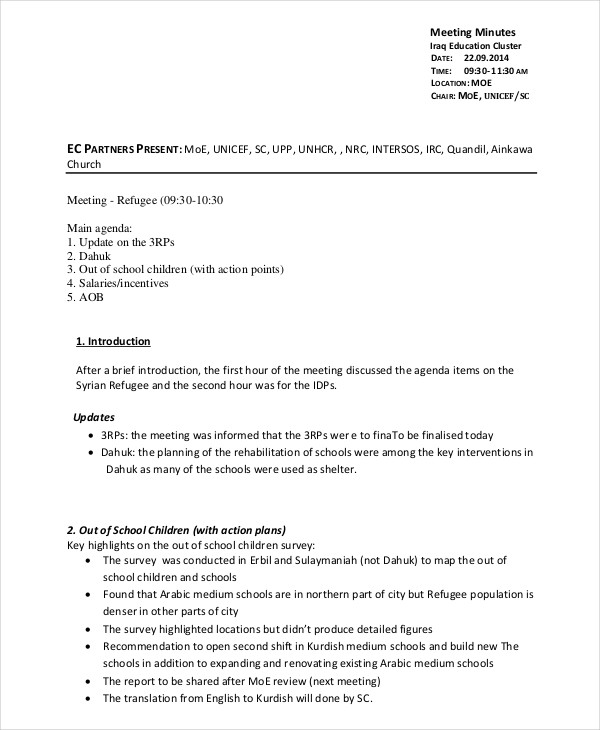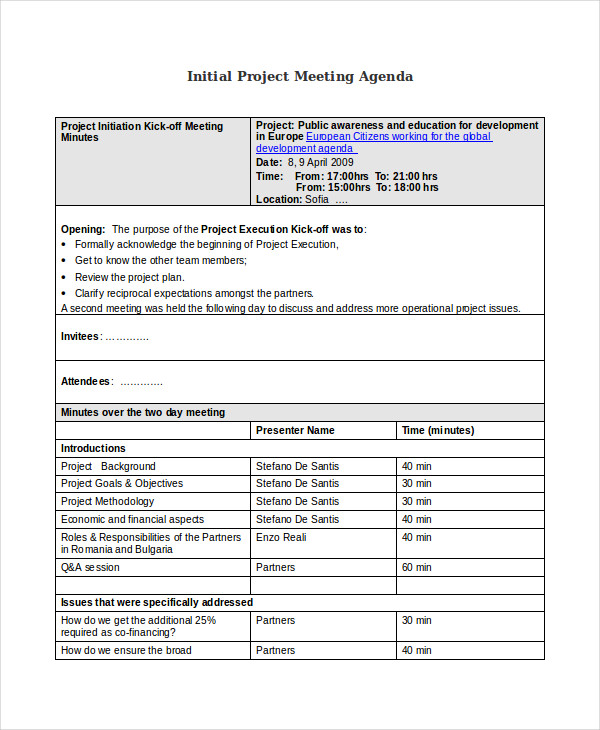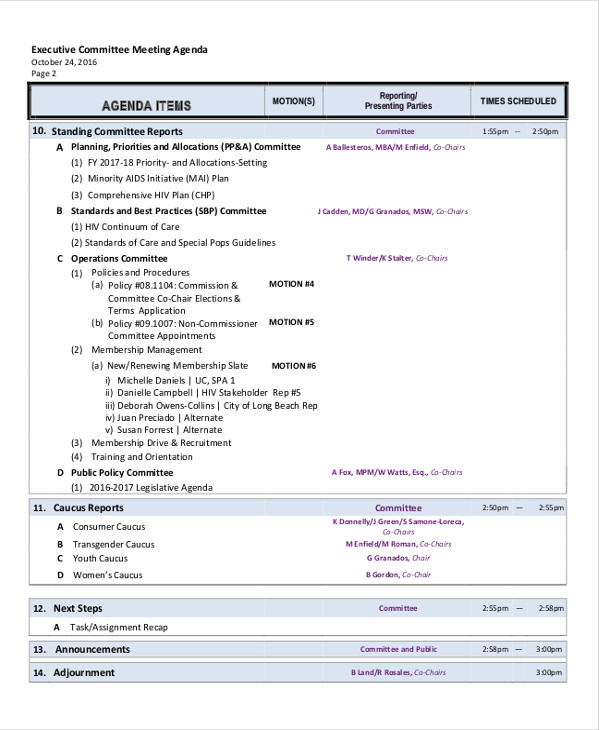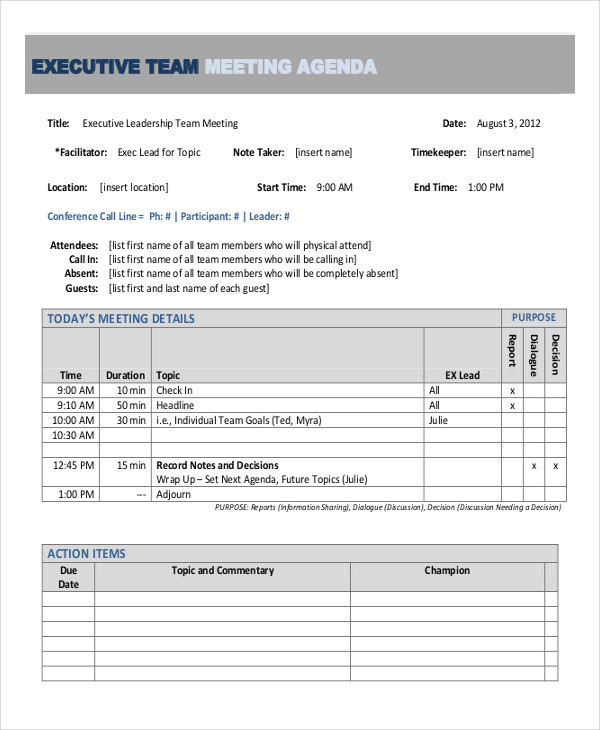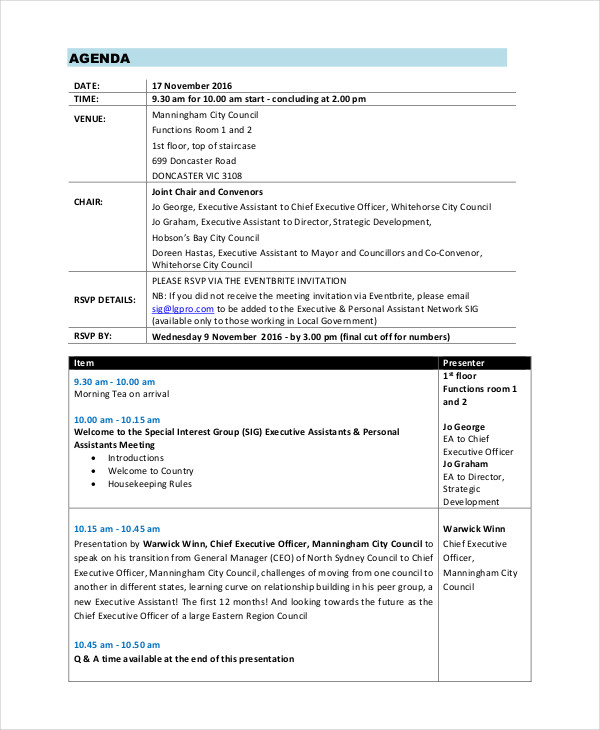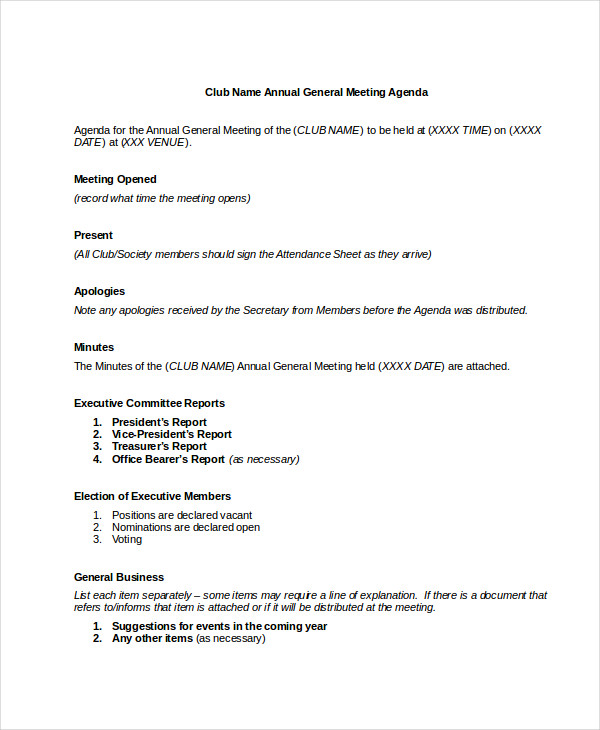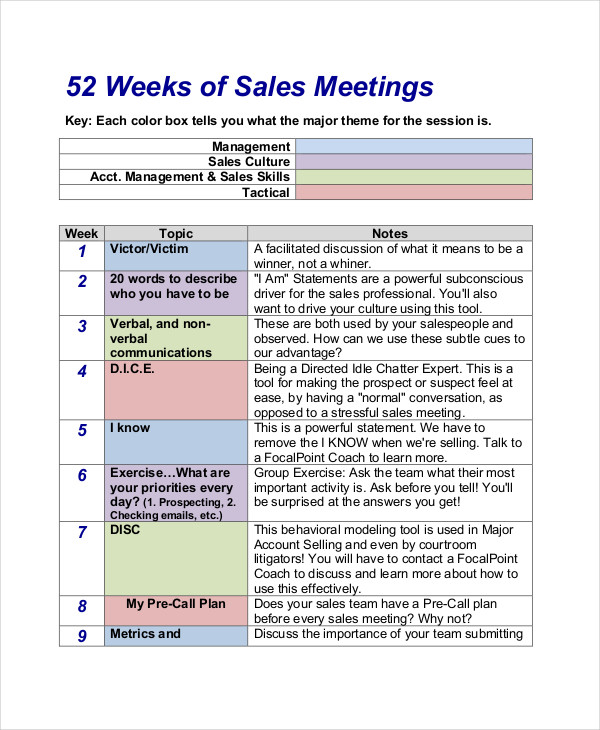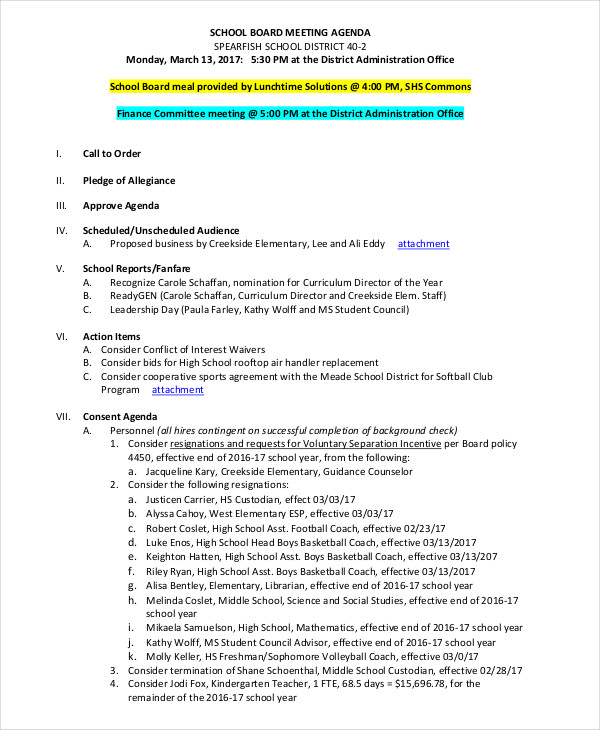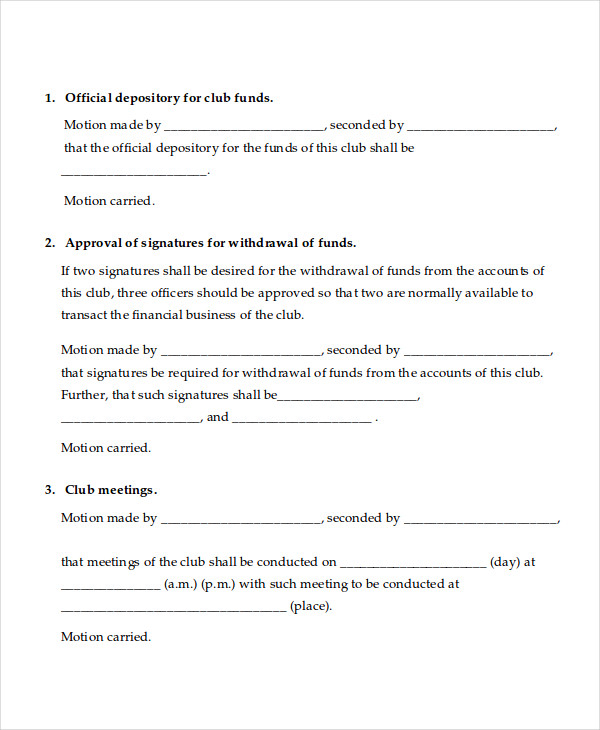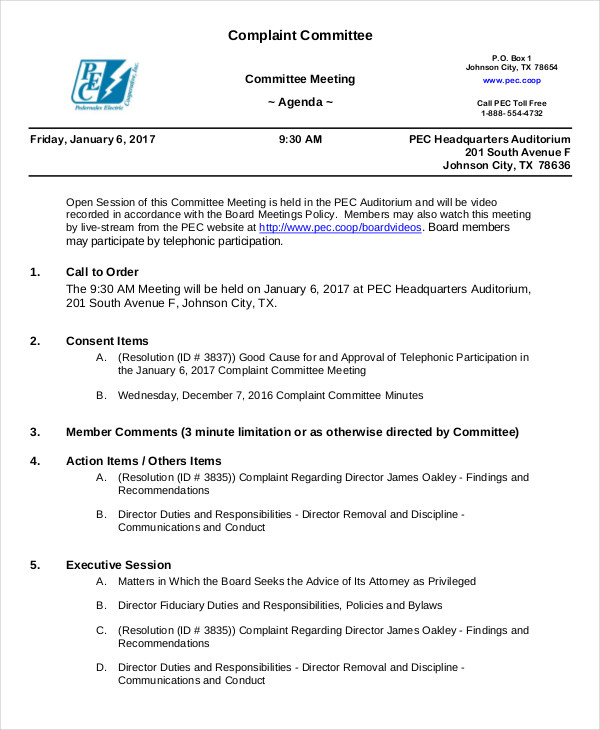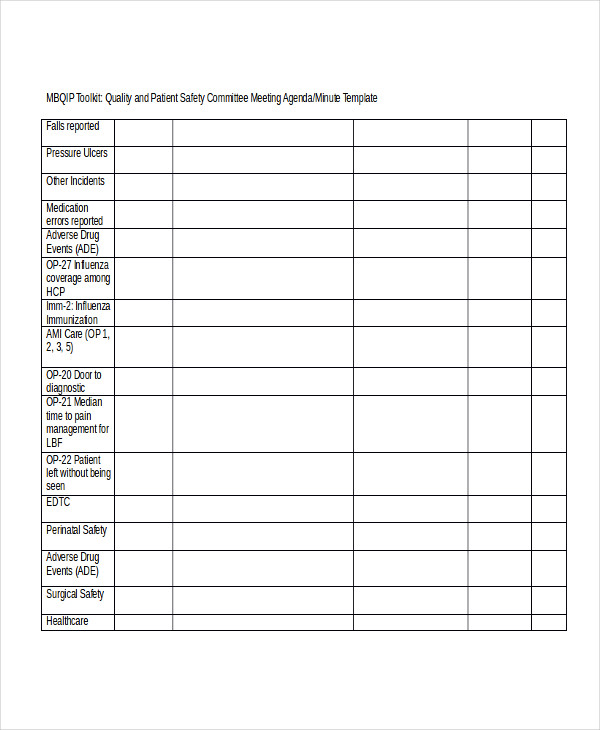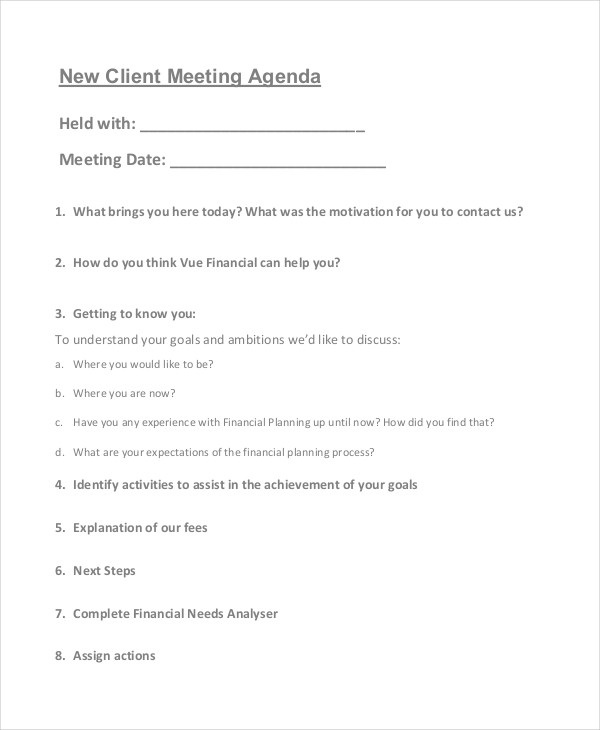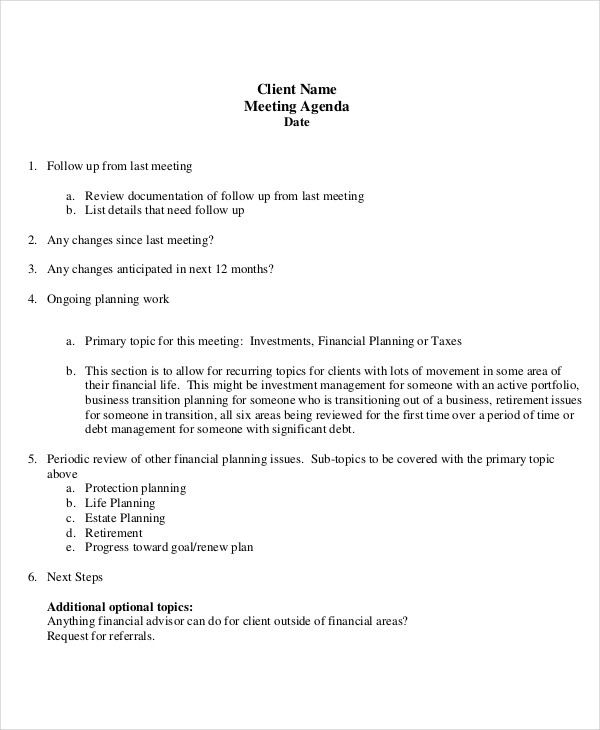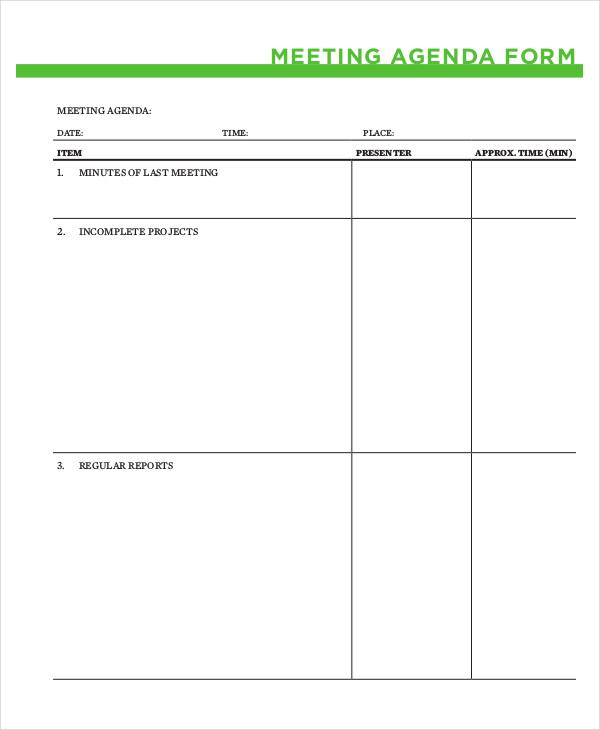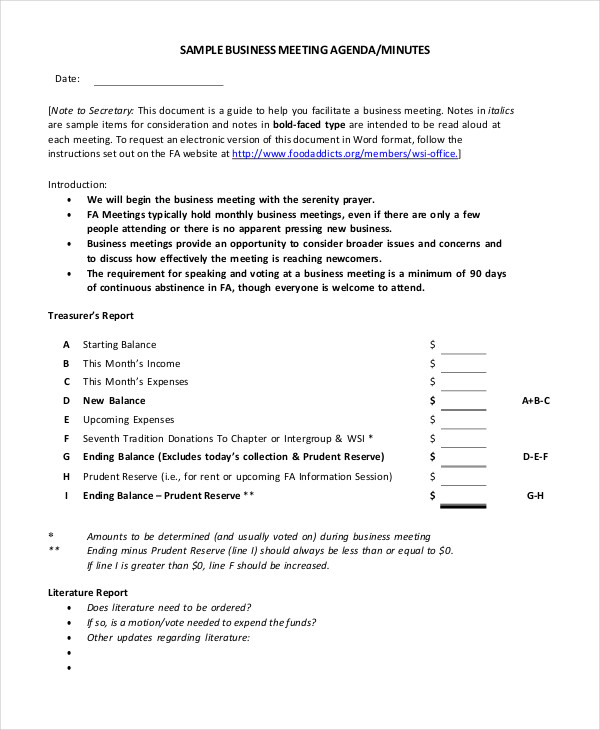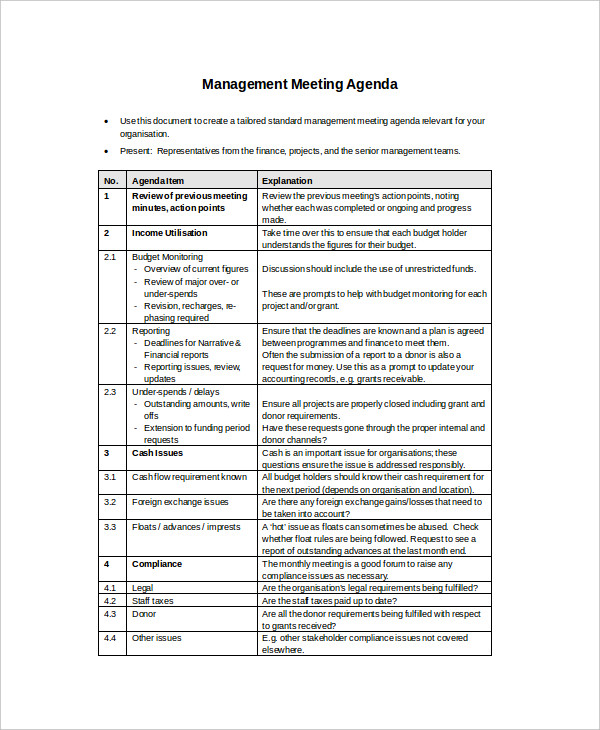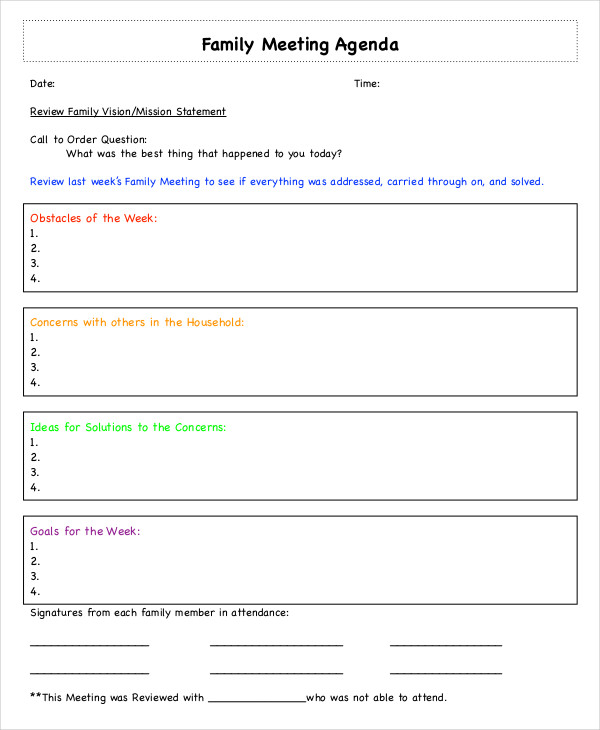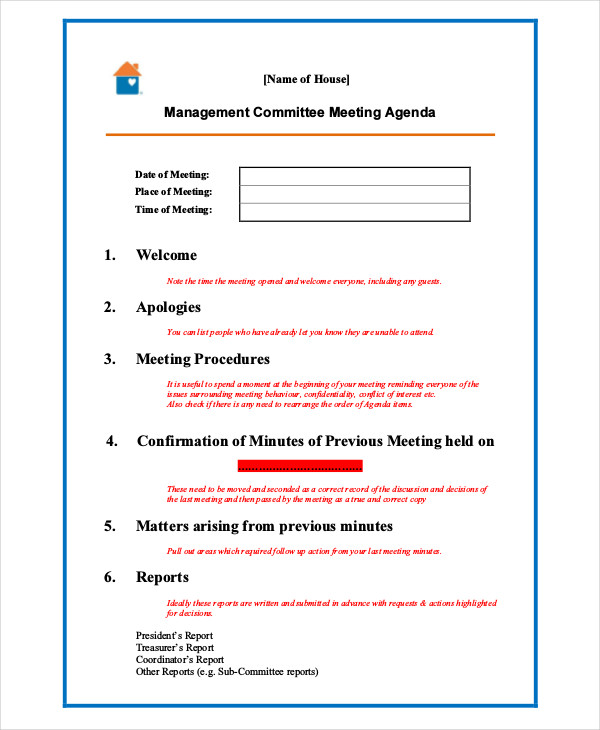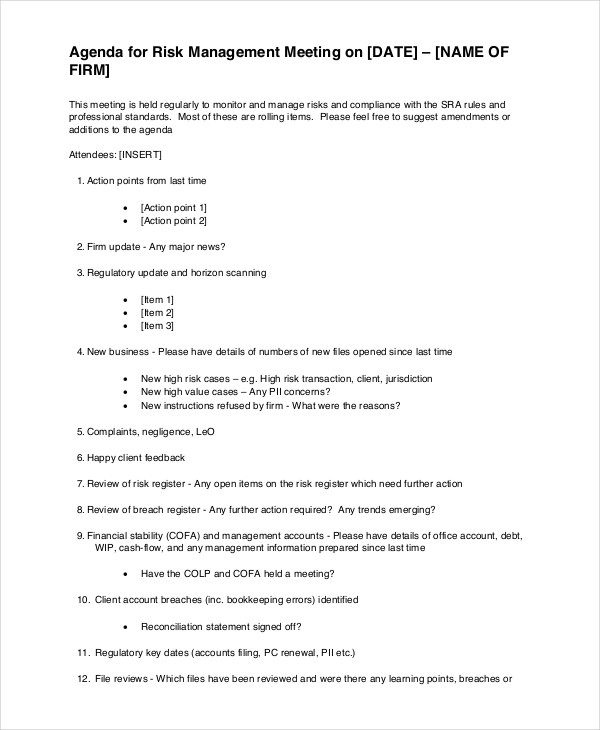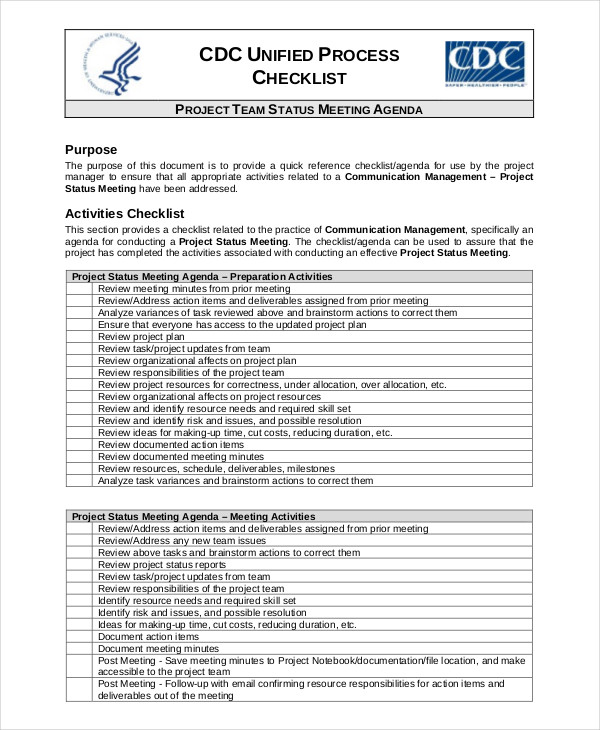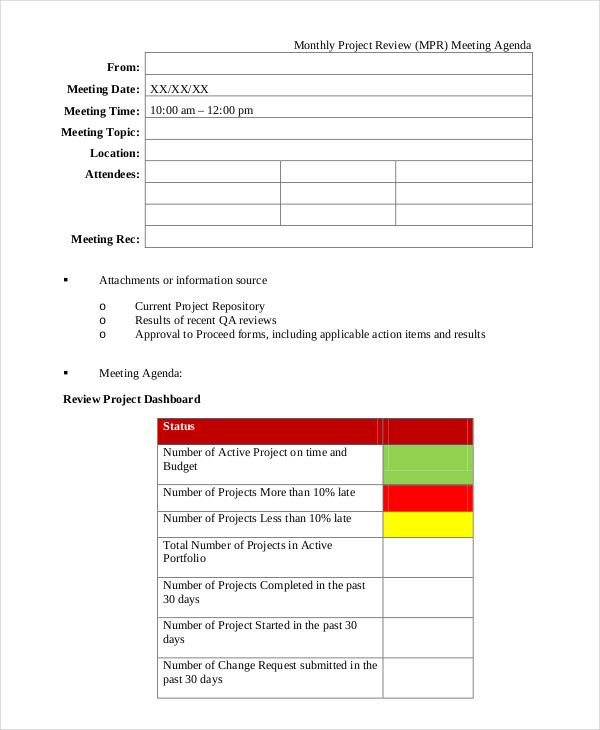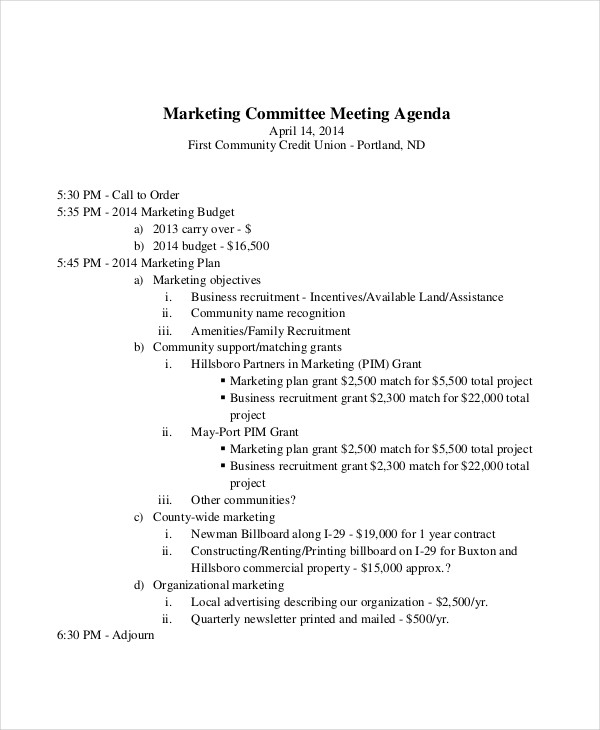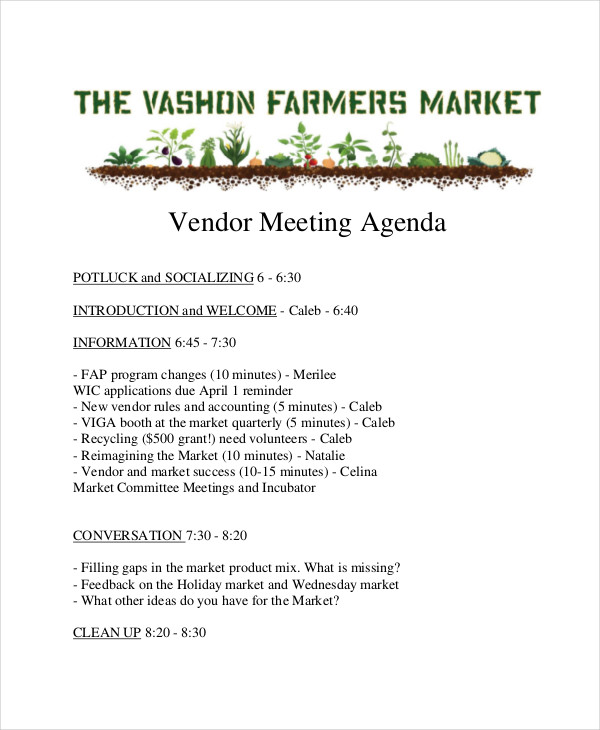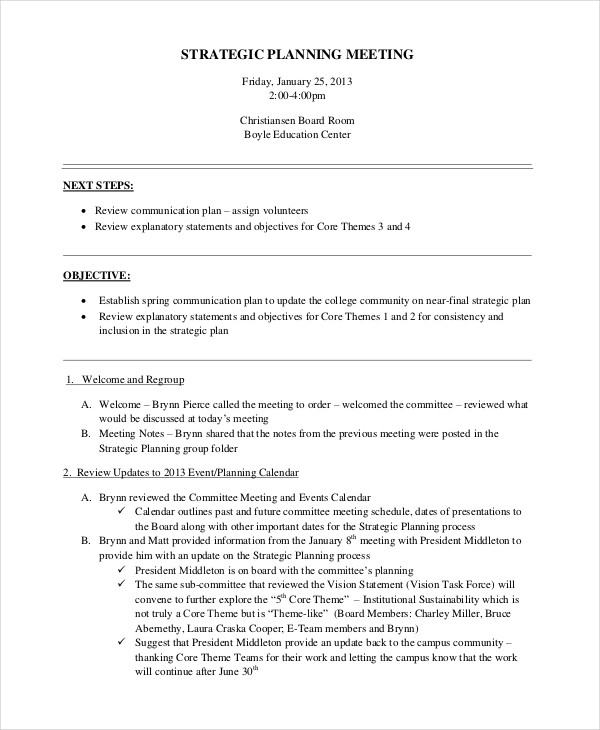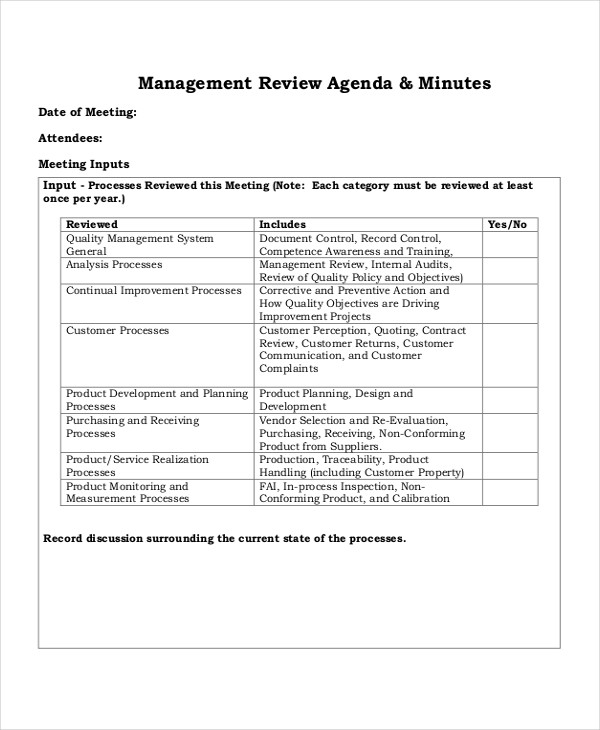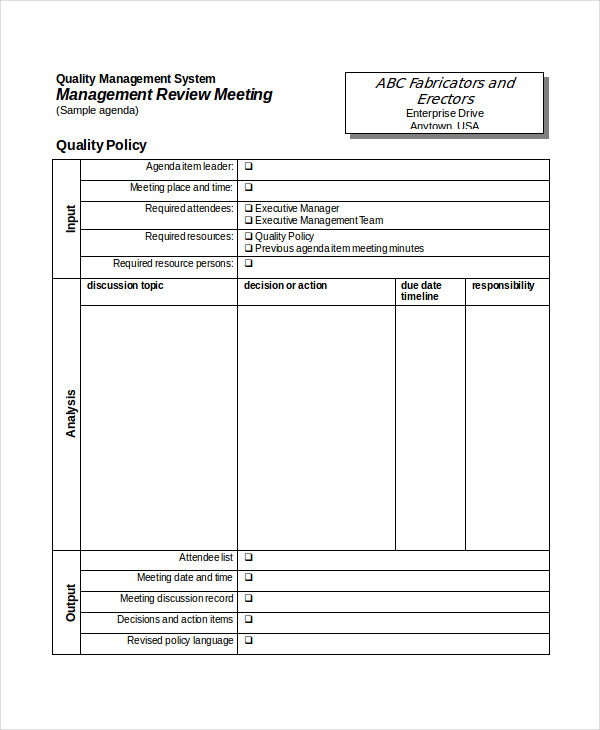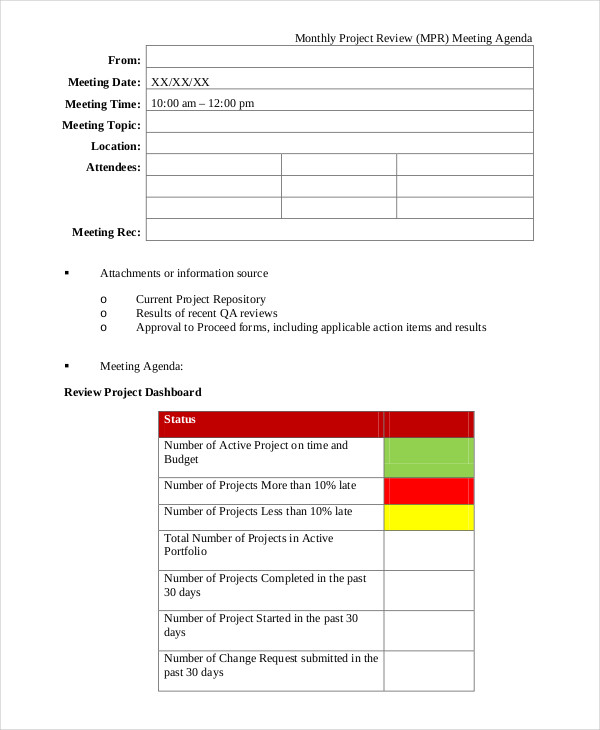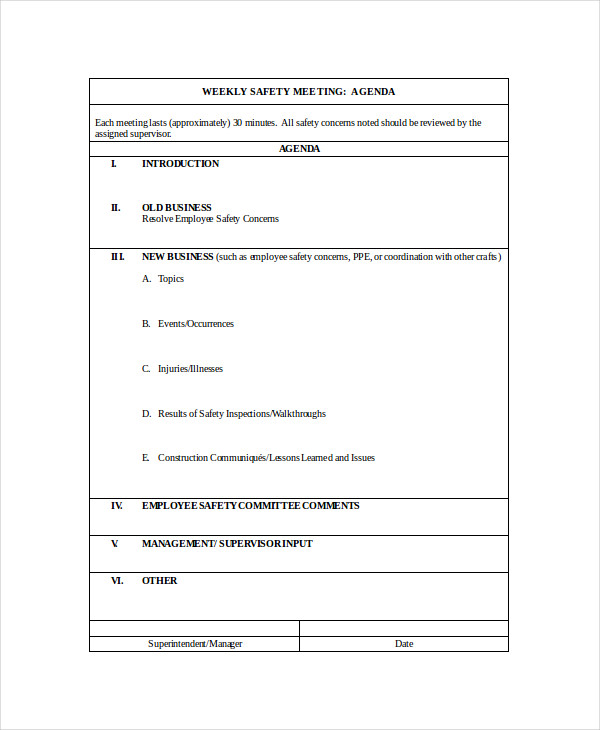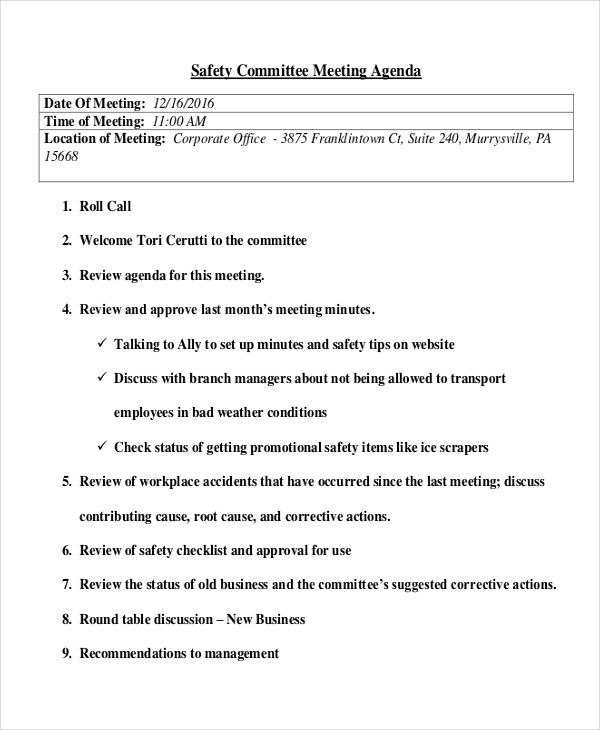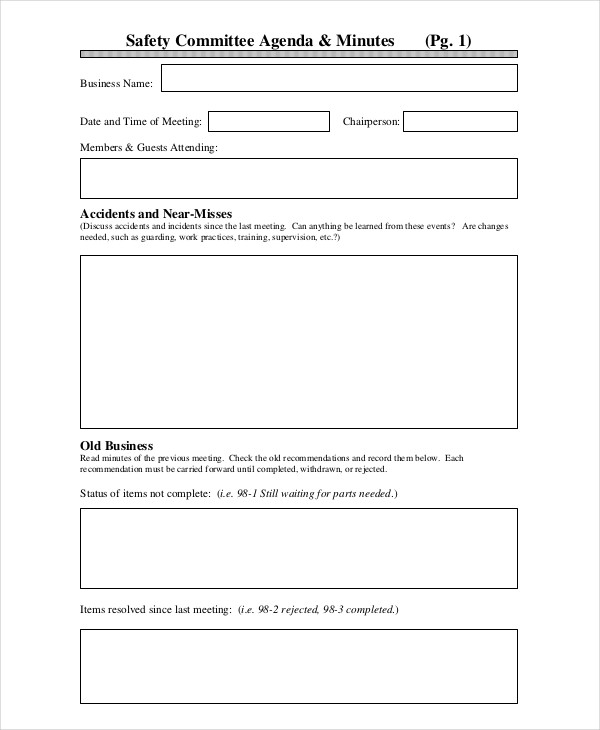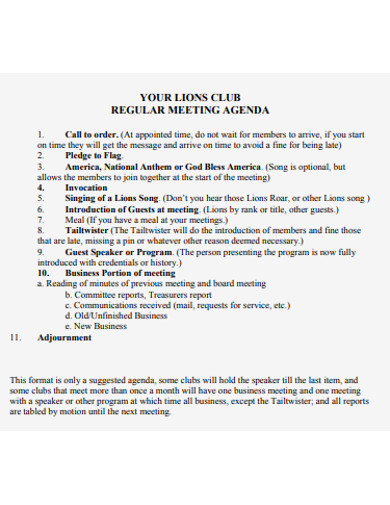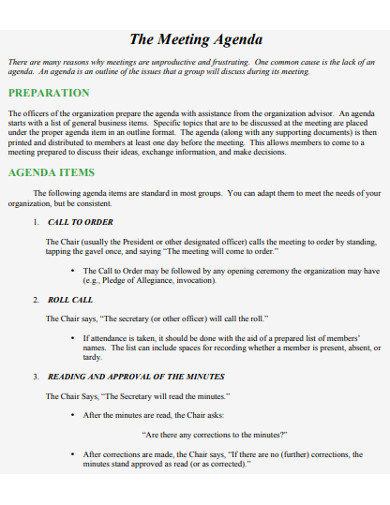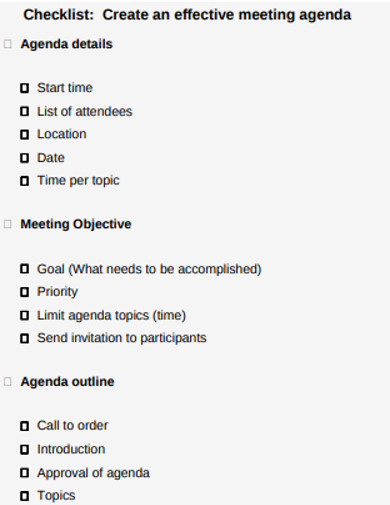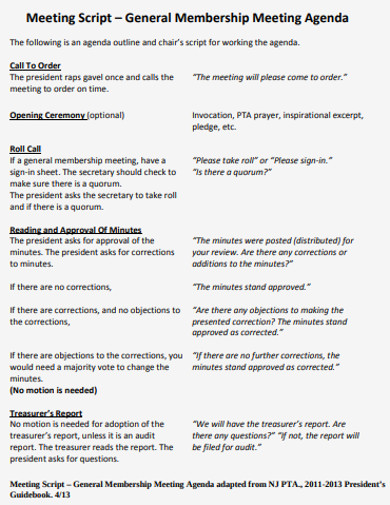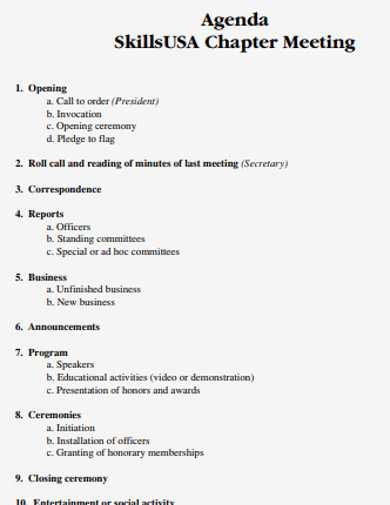57+ Meeting Agenda Examples to Download
A successful meeting is a result of a well-organized and prepared agenda. Meetings can be boring, disruptive, and time-consuming if not utilized properly. No wonder some would even consider it a waste of time. An effective and well-made agenda, especially when created using professional agenda templates, results in better team cohesion and understanding. This then leads to increased team efficiency in addressing issues and problems.
Examples found on this page vary from business meeting agendas to safety meeting agendas and even family meeting agendas. All of them are even available to download for free! So, have a look around and feel free to click on the download button of the sample of your choice.
What is a Meeting Agenda?
A meeting agenda is a document that outlines the topics and issues that will be discussed during a meeting. It serves as a roadmap for the meeting, providing structure and focus for the participants. A typical meeting agenda includes the date, time, and location of the meeting, as well as a list of the items to be discussed, the names of the presenters or speakers, and the allotted time for each item. The agenda is usually distributed to the participants in advance of the meeting to allow them to prepare and to ensure that everyone is on the same page. A well-prepared agenda can help to ensure that meetings are productive, efficient, and achieve their intended outcomes.
Meeting Agenda Format
1. Opening Section
- Meeting Title: [Title of the Meeting]
- Date: [Date]
- Time: [Start Time] – [End Time]
- Location: [Meeting Location or Virtual Meeting Link]
- Facilitator: [Name of the Meeting Facilitator]
- Attendees: [List of Participants]
2. Objectives
- Briefly state the purpose and expected outcomes of the meeting.
3. Approval of Agenda
- Participants review and approve the agenda to ensure all topics of importance are included.
4. Review and Approval of Previous Meeting Minutes
- Brief summary of the last meeting’s outcomes.
- Approval of previous meeting minutes.
5. Old Business
- Discussion on unresolved items from previous meetings.
- Updates on tasks or projects previously discussed.
6. New Business
- Introduction of new topics for discussion.
- Assigning responsibilities for each new item.
- Discussion and decision-making on new business items.
7. Specific Agenda Items
- [Item Title]
- Presenter: [Name]
- Time Allotted: [Time]
- Discussion Points: [Key points to discuss]
- Action Items: [Tasks to be completed, responsible persons]
(Repeat for each agenda item)
8. Open Discussion
- Time allocated for attendees to bring up additional topics not listed on the agenda.
9. Announcements
- Sharing of relevant announcements or upcoming events.
10. Action Items Summary
- Recap of decisions made and tasks assigned during the meeting, including responsible persons and deadlines.
11. Adjournment
- Official closing of the meeting.
- Confirmation of the next meeting date, time, and location (if applicable).
12. Signature
- Facilitator’s Signature: _________ [Facilitator signs here]
- Date: _________ [Date of signing]
Meeting Agenda Example
Meeting Title: Monthly Strategy Review Meeting
Date: February 28, 2024
Time: 10:00 AM – 12:00 PM
Location: Conference Room B, 3rd Floor
Objective: To review the progress of current projects, discuss new strategies for the upcoming quarter, and address any immediate concerns within the team.
Agenda Items:
- Opening Remarks
- Time: 10:00 AM – 10:05 AM
- Led by: John Smith, Department Head
- Approval of Last Meeting’s Minutes
- Time: 10:05 AM – 10:10 AM
- Led by: Jane Doe, Assistant Manager
- Project Updates
- Time: 10:10 AM – 10:40 AM
- Led by: Project Managers
- Details: Brief updates on the status of ongoing projects, including milestones achieved and any challenges encountered.
- Financial Overview
- Time: 10:40 AM – 10:55 AM
- Led by: Michael Lee, Finance Director
- Details: Presentation of the current financial status and budget allocations for the upcoming quarter.
- Strategy Discussion for Next Quarter
- Time: 10:55 AM – 11:25 AM
- Led by: Sarah Patel, Strategy Consultant
- Details: Discussion on proposed strategies, market trends, and opportunities for growth.
- Open Forum for Team Concerns
- Time: 11:25 AM – 11:50 AM
- Led by: John Smith, Department Head
- Details: An opportunity for team members to bring up any concerns, suggestions, or ideas for improvement.
- Closing Remarks and Action Items
- Time: 11:50 AM – 12:00 PM
- Led by: Jane Doe, Assistant Manager
- Details: Summary of decisions made, assignment of action items, and announcement of the next meeting date.
Preparation:
- Please review the project reports and financial summaries before the meeting.
- Come prepared with any questions or topics you would like to discuss during the open forum.
RSVP:
- Confirm your attendance with Jane Doe by February 25, 2024.
Note: Refreshments will be provided. Please notify Jane Doe of any dietary restrictions.
Meeting Agenda Ideas
- Formal Meeting Agenda
- Meeting Agenda for Staff
- Company Meeting Agenda
- Meeting Agenda for Teacher
- Small Business Meeting Agenda
- Architectural Meeting Agenda
- Internal Meeting Agenda
Meeting Agenda Examples & Templates
Meeting Agenda
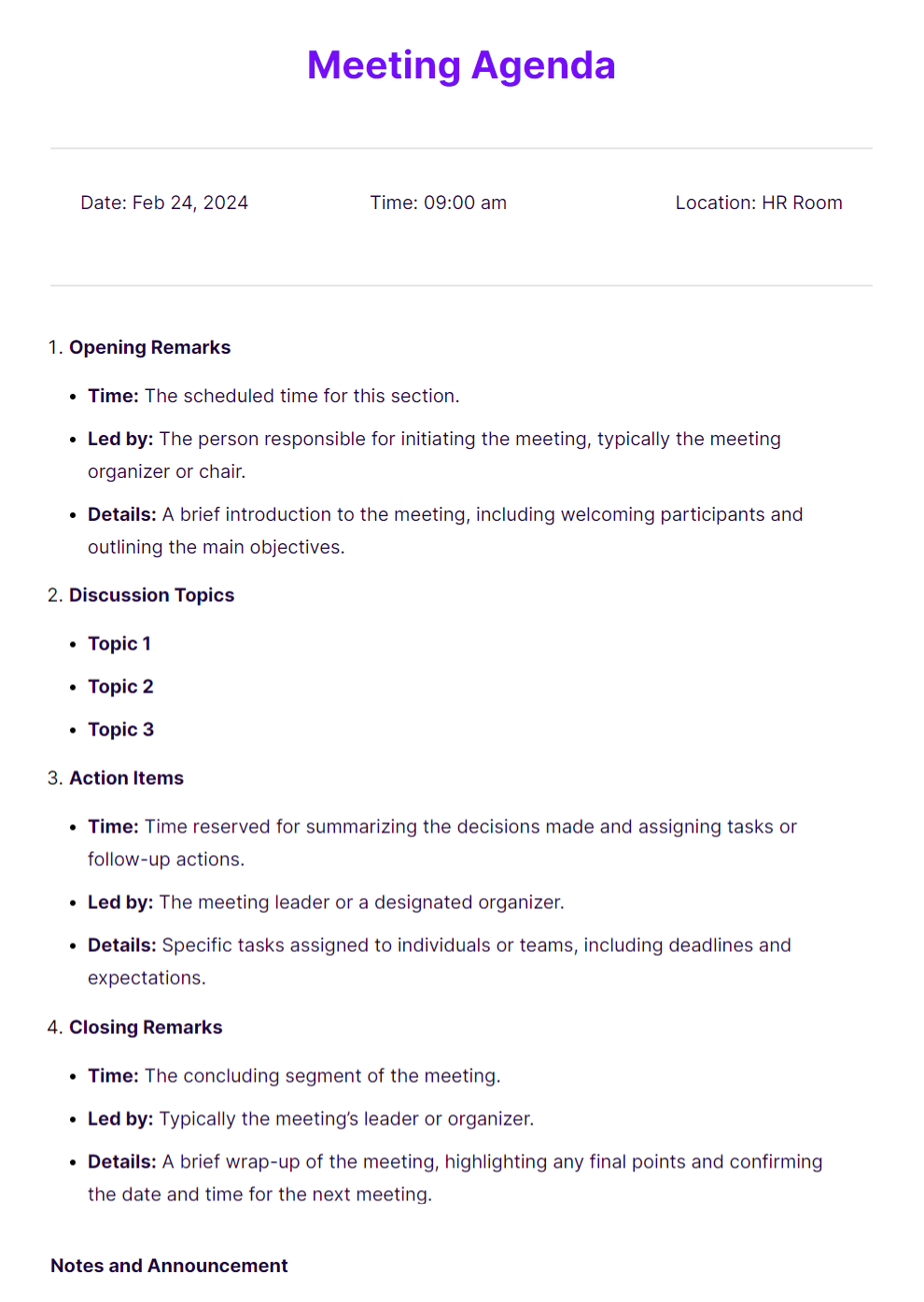
Free Meeting Agenda Template
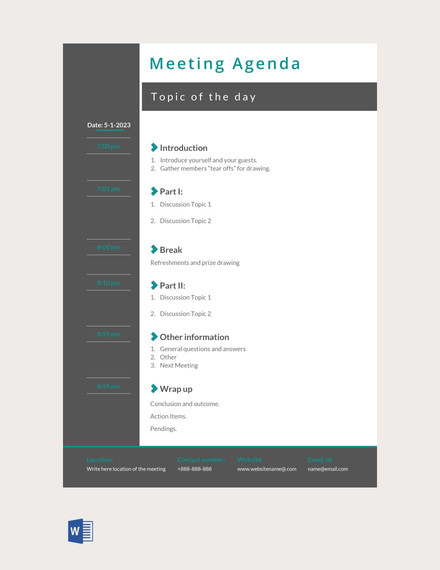
Sample Meeting Agenda Template
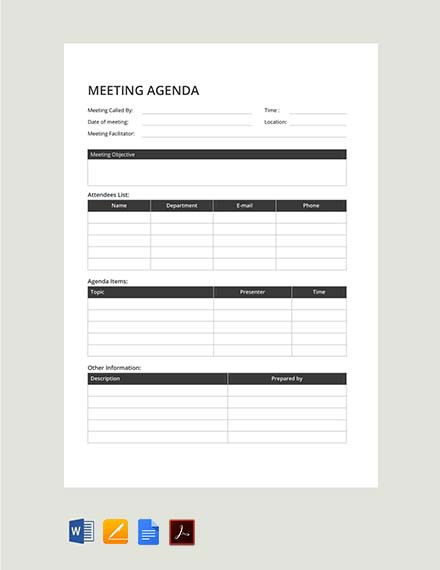
Simple Meeting Agenda Template
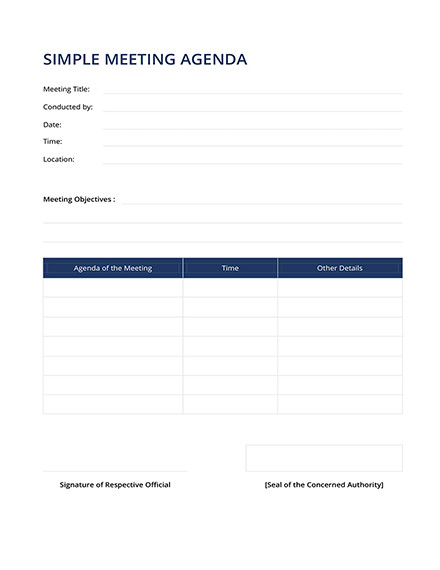
Team Meeting Agenda Template
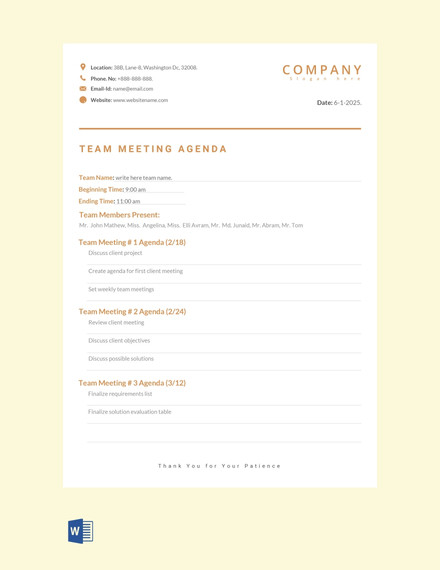
Staff Meeting Agenda Template
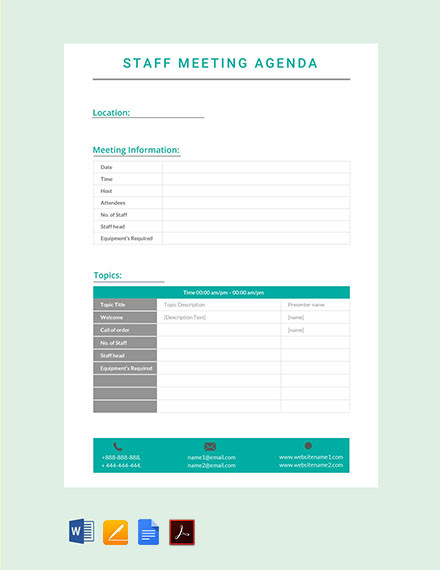
Staff Meeting Agenda Example
The Advantage Weekly Staff Meeting Agenda
First Staff Meeting Agenda Sample
Business Meeting Agenda
Annual Church Business Meeting Agenda
Business Client Meeting Agenda Template
Business Vendor Meeting Agenda
Staff Business Meeting Agenda
Sample Generic Business Meeting Agenda/Minutes
Sales Meeting Agenda
Marketing Sales Meeting Agenda
Business Sales Meeting Agenda
Weekly Sales Team Meeting Agenda
Sample Sales Training Meeting Agenda
Team Meeting Agenda
Leadership Team Meeting Agenda
Executive Management Team Meeting Agenda
Weekly Team Meeting Agenda
Project Meeting Agenda
Project Team Status Meeting Agenda
New Project Meeting Agenda/Minutes
Initial Project Meeting Agenda
Executive Meeting Agenda
Executive Committee Meeting Agenda
Executive Team Meeting Agenda
Executive Assistant Meeting Agenda
Annual Meeting Agenda
Annual General Meeting Agenda
Annual Sales Meeting Agenda
Board Meeting Agenda
School Board Meeting Agenda
First Board Meeting Agenda
Committee Meeting Agenda
Complaint Committee Meeting Agenda
Safety Committee Meeting Agenda
Client Meeting Agenda
New Client Meeting Agenda
Client Review Meeting Agenda
Free Meeting Agenda
Free Printable Meeting Agenda
Free Sample Business Meeting Agenda
Free Management Meeting Agenda
Family Meeting Agenda
Business Family Meeting Agenda
Weekly Family Meeting Agenda
Management Meeting Agenda
Free Management Committee Meeting Agenda
Risk Management Meeting Agenda
Project Management Meeting Agenda
Monthly Meeting Agenda Examples
Monthly Project Review Sales Meeting Agenda
Marketing Meeting Agenda
Marketing Committee Meeting Agenda
Farmer’s Market Vendor Meeting Agenda
Planning Meeting Agenda
Strategic Planning Meeting Agenda
Review Meeting Agenda
Management Review Meeting Agenda
Business Managemet Review Meeting Agenda
Monthly Project Review Meeting Agenda
Safety Meeting Agenda
Monthly Safety Meeting Agenda Template
Weekly Safety Meeting Agenda
Free Safety Committee Meeting Agenda
Sample Safety Committee Agenda and Minutes
Meeting Agenda Example
Sample Meeting Agenda
Basic Meeting Agenda
General Meeting Agenda
Meeting Agenda in PDF
How to make a Meeting Agenda
By following these steps, you can create a meeting agenda that is organized, focused, and effective.
Step 1: Determine the purpose of the meeting
Start by identifying the reason why the meeting is being called. Is it to share information, make a decision, or brainstorm ideas? Knowing the purpose will help you create an agenda that is focused and efficient. See examples of Staff Meeting Agenda, which clearly indicates the type of meeting that would be held.
Step 2: Invite the right people
Identify who needs to attend the meeting based on the purpose. Make sure to invite only those who are necessary to the discussion. See the Safety Meeting Agenda for a perfect example.
Step 3: Set a date and time
Consider the availability of the participants when scheduling the meeting. Make sure to schedule the meeting with enough time for participants to prepare for the discussion.
Step 4: Choose a format
Decide on the format of the meeting, whether it will be in-person, virtual, or hybrid.
Step 5: Create a list of topics to discuss
Write down all the topics that need to be discussed during the meeting. Organize them by priority or logical sequence including examples of strategic action plans.
Step 6: Set time limits for each topic
Assign a time limit to each topic to ensure that the meeting stays on track and is not prolonged unnecessarily.
Step 7: Assign responsibility for each topic
Assign a person responsible for leading the discussion for each topic.
Step 8: Share the agenda
Share the agenda and scripts with all the participants at least a day before the meeting so that they can prepare themselves accordingly.
Step 9: Follow up after the meeting
After the meeting, follow up with participants to ensure that action items are assigned and completed.
Benefits of an Effective Meeting Agenda
An effective meeting agenda is a crucial tool that guides discussions, ensures efficient use of time, and enhances the productivity of meetings. Below are some of the key benefits of having a well-prepared meeting agenda:
- Improved Focus and Clarity: An agenda sets clear expectations for what will be discussed, helping participants to stay on topic and avoid unnecessary digressions. This focus ensures that meetings are more productive and that discussions are relevant to the meeting’s objectives.
- Enhanced Preparation: With an agenda distributed in advance, participants can prepare for the meeting more effectively. They have the opportunity to gather necessary information, think about the topics to be discussed, and formulate questions or contributions. This preparation leads to more informed and constructive discussions.
- Better Time Management: An agenda outlines the time allocated for each item, helping to ensure that the meeting covers all topics within the available time frame. It prevents any single topic from dominating the meeting, thereby ensuring that all important issues receive the attention they deserve.
- Increased Engagement: When participants know the topics of discussion in advance and understand their relevance, they are more likely to be engaged and actively contribute. This increased engagement results in more dynamic and productive meetings.
- Facilitation of Decision-Making: A well-structured agenda includes specific items that require decisions, thereby focusing the discussion and facilitating a more systematic decision-making process. This clarity helps in achieving concrete outcomes and action points from the meeting.
- Effective Record Keeping: An agenda serves as a template for the minutes of the meeting, making it easier to record discussions, decisions, and action items. This documentation is essential for tracking progress and for informing individuals who were unable to attend the meeting.
- Enhanced Accountability: By assigning discussion points and action items to specific individuals, an agenda helps establish accountability. Participants are more likely to follow through on commitments when their responsibilities are clearly outlined and documented.
- Reduction of Stress: Knowing the agenda in advance can reduce anxiety for participants by providing a clear outline of the meeting’s structure. This foresight allows individuals to approach the meeting with confidence, knowing what to expect.
- Promotion of Team Collaboration: An effective agenda encourages collaboration by ensuring that all relevant stakeholders have an opportunity to contribute. This inclusivity fosters a sense of teamwork and collective responsibility for the meeting’s outcomes.
- Optimization of Meeting Outcomes: Ultimately, an effective agenda leads to more productive meetings with clear outcomes, decisions, and actionable steps. This efficiency not only saves time but also contributes to the overall success of projects and initiatives.
FAQs
Why is a meeting agenda important?
A meeting agenda is important because it provides structure and direction to the meeting. It ensures that all relevant topics are covered, the meeting stays on track, and time is used efficiently. It also helps participants prepare for the meeting by providing an overview of the topics that will be discussed.
What should be included in a meeting agenda?
A meeting agenda should include the purpose of the meeting, a list of topics to be discussed, the time allotted for each topic, and the names of the participants. It may also include any relevant materials or pre-reading that participants need to review before the meeting. See examples of meeting action plan, meeting outline, conference budget, and meeting summary report to know the essentials for a meeting agenda
When should a meeting agenda be distributed?
A meeting agenda should be distributed to participants at least 24 hours before the meeting. This gives participants enough time to prepare themselves, review any relevant materials, and come to the meeting ready to participate.
In conclusion, a well-organized meeting agenda is essential to a productive and efficient meeting. It helps to ensure that all relevant topics are covered, time is used effectively, and participants are well-prepared. By following the steps outlined above and considering the frequently asked questions, you can create a meeting agenda that sets the tone for a successful meeting.


